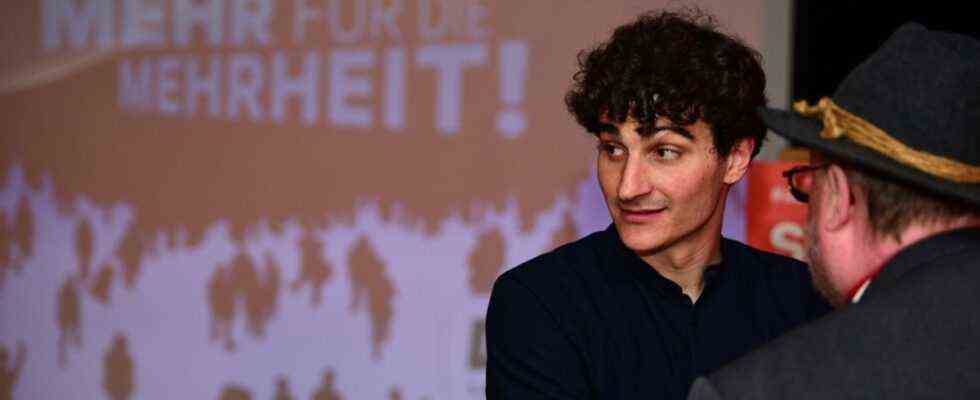It’s a successful date for Ates Gürpinar, apparently also for the young woman in the screen window next to it. She wants to know something about gender equality from the regional head of the Left and Rosenheim direct candidates, but, she says, “down-to-earth things” like the wage gap between women and men, not just genders; she also has questions about the energy transition. Gürpinar in his zoom window – mid 30s, hoodie, curly hair – goes deep into the left program: minimum wage, pension level, spouse splitting. And he says that the energy companies, who wanted to make a lot of profit, “have to go into joint hands”. The questioner often nods in the digital tete-a-tete during this quarter of an hour.
Gürpinar has an easy time of it with “speed dating”, to which he repeatedly invites: The young woman has already been to an event in the constituency and is more or less a sympathizer. The follow-up participants, mostly a good five in the online election campaign, are not considered to be conservatives who all of a sudden flirt with the left wing – it is an inclined audience that uses the opportunity to get in direct contact with politicians. Women’s rights, training, Hartz IV, that’s what it’s all about.
Final spurt of the election campaign for the left in Bavaria. It has not been denied for a few weeks that she is in public focus. The party is on everyone’s lips, especially in the mouths of Markus Söder and CSU General Secretary Markus Blume. “Preventing left-hand slipping” is their slogan, which is posted across the board. Söder and Blume are concerned with a “diluted left-wing government” with a traffic light, even more with red-red-green. This is “not a red sock campaign reloaded”, but a necessary warning, they say. The CSU board recently published a multi-page polling call that lists the consequences it believes are threatening for the people of Bavaria. “None of the 13.14 million Bavarians would be spared from sliding to the left in their everyday lives.” Everyone is concerned with money, substance and lifestyle, through taxes, debts, and possibly expropriations.
Gürpinar interprets it as follows: “The CSU campaign may unite their ranks – but otherwise this desperate and completely empty stirring up of fear brings us attention.” It leads to people grappling with programs “and hopefully noticing that Olaf Scholz and Annalena Baerbock really don’t want to change anything. In the last few days we have to communicate with the fact that we are the central force to change something – Social affairs, peace policy, sustainability “.
However, attention can’t hurt. The latest BR “Bavaria trend” sees the left in the Free State at three percent. Missing the five percent hurdle would not result in a left-wing parliamentary group without a Bayern Munich; with a nationwide result at the poll level, candidates from the state list would go to the Bundestag; probably also Gürpinar, fourth place. But symbolically, these are not good prospects. BR election expert Andreas Bachmann had said at the presentation of the survey that in view of the SPD upswing by Olaf Scholz, “Comrade Trend is marching”. The left are comrades – but not much marches there.
Gürpinar emphasizes that the left has long been seen “as a natural part of the party spectrum” in Bavaria too. Experience in the election campaign confirmed this. One imagines it as clichéd: A leftist knocks on the door in the country, the peasant woman crosses herself in horror, sprinkles holy water. Nothing there, says Gürpinar and tells, for example, from Halfing near Rosenheim: “When we walk through the village there are of course some who say: Leftists, need’ma ned. But that was never angry, the people are more open.” He also experiences this in Lower Bavaria and the Upper Palatinate. “Especially where the CSU is responsible for a disastrous structural policy, people listen to us.”
In general, if parties are not in the state parliament, they are hardly on the screen of the political public; in the FDP, for example, which was elected from the Maximilianeum for five years in 2013, they know that too well. At the same time, the left was also able to make some hype recently, with its complaint against the police law, for example, or in the referendum on care. Gürpinar points to an increase in membership, within five years by a good 1000 to 3400. They are mostly young, committed new leftists, not members of the map like the rest of the PDS in East Germany. Election campaign times are always recruiting times; the woman from speed dating is interested. She asks about the Bundeswehr, she has soldiers in the family, she is in a “conflict”: It needs good equipment, but somehow disarmament. Gurpinar’s approach: “German soldiers have no business abroad.”
He sends her the link to the membership application. “The problem is that we are often not firmly anchored locally, that we have strong membership growth, but not enough for such a large state,” says the head of the state: “Members campaign, carry ideas forward, are faces and contact person on site “- that is also relevant to finally move into the state parliament in 2023.

